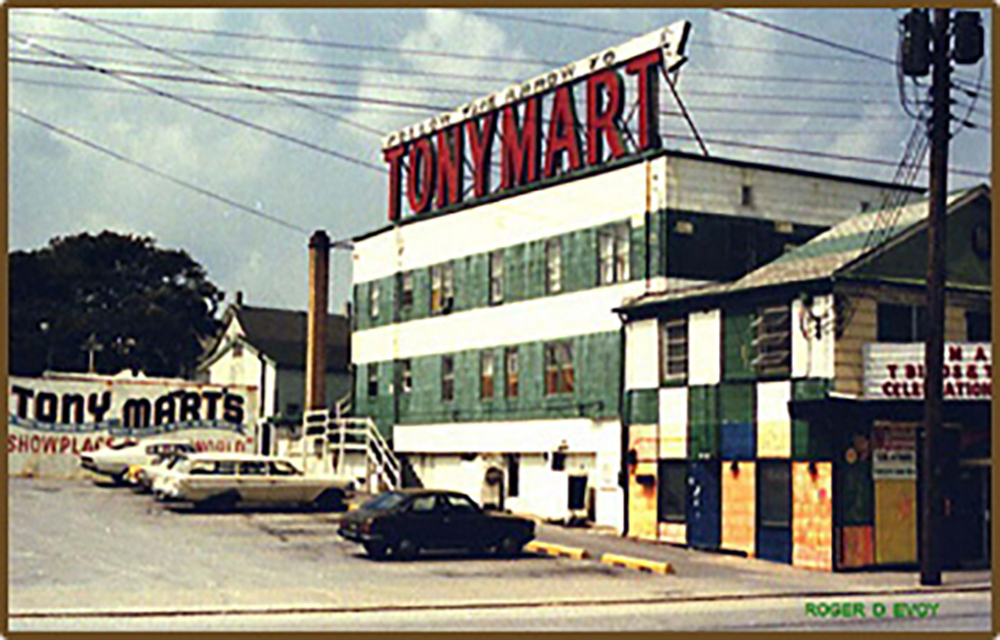An ongoing series
The Bikers Threat
By Bill Kelly
The call came in from the Ohio State Police Intelligence Unit to the Ocean City Chief of Police.
One of their undercover agents infiltrating criminal motorcycle gangs in that state reported that a group of Hells Angels with California rockers passed through and complained about being ticketed for speeding and kicked out of Ocean City, New Jersey, causing them much ridicule and embarrassment.
They threatened to return to Ocean City with their entire club and all of their allies for a Labor Day run and ransack the town.
The Ocean City Police Department’s Intelligence Unit chief was already preoccupied with keeping tabs on the growing hippie threat.
Mrs. Helen Shriver Schilling, whose father started the candy store, now owned the entire block, all of the boardwalk movie theaters as well as the boardwalk parking lots. The boardwalk used to be a block further from the ocean but after the great fire of 1927 her father and other boardwalk property owners arranged for the new boardwalk to be built a block closer to the ocean, making the beach smaller, but giving them a free block of land, which was mainly converted to parking lots.

Riotous conditions had developed at Weirs Beach located on Lake Winnipesaukee at Laconia, New Hampshire, on the night of June 19, 1965, when a crowd of 6,000 to 10,000 men and women who had congregated on Lakeside Avenue at the resort became disorderly and defined the local police. The crowd was composed primarily of motorcyclists from all parts of the United States who were in the area to attend the annual motorcycle races at nearby Loudon, New Hampshire. Most of the individuals were in their twenties or early thirties.
Trouble first occurred at about 7:00 p.m. on June 19, 1965, when someone threw a smoke bomb and the crowd converged in that area. Several more smoke bombs were thrown in the next hour with similar results. The crowd became disorderly and noisy, taunted police officers with vulgar and profane remarks, and interfered with traffic.
The crowd had become an unruly mob completely defiant of police orders. Members of the mob fought among themselves, threw firecrackers, rocks and over turned two automobiles, one of which caught fire. An unsuccessful attempt was made to burn a bowling alley by pouring gasoline into the air-conditioning system of the building and igniting it. At 9:30 p.m., traffic was completely stopped in the area and some of the motorcyclists were drag racing amid the mob.
The Riot Squad of the Laconia Police Department, consisting of thirty men, moved into the area at 10:10 p.m. equipped with shotguns and other riot gear. They were met with a barrage of flying objects from the mob which refused to move. At that time the local police were joined by sixty New Hampshire State Police troopers and by officials of the Belknap County Sheriff’s Office. Tear gas was used by the police with little effect, the mob still refusing to disperse. Shotguns were then brought into play by the police who fired birdshot at the feet of the rioters Approximately 200 members of the National Guard detail assisted the police in the clean-up operation.
A rumor that the motorcyclists would attempt a similar riotous disturbance on the night of June 20th 1965 did not materialize. As of 12:45 a.m., June 21, all of the motorcyclists had left the area and conditions were quiet.
The Ocean City Mayor then said, “I’ve contacted Governor Hughes and he’s prepared to help us. He said that he will make a contingent of State troopers available to us, as well as the 300 cadets at the State Police Academy, and put the National Guard on alert in case they are needed. The President and Attorney General have also been advised and they have indicated they will back us if we need any national support.
“The president of the United States?” the chief said incredulously.
“Yes,” the mayor said. “The President of the United States has taken a personal interest in this matter. I’ve also informed Mr. Kirkman and he said for us to take care of it. So I’ve asked Mr. Stretch the public safety commissioner to work with you and come up with a contingency plan that will effectively deal with over one thousand outlaw bikers and ensure the public safety is maintained. Now get to it.”
The Hangover League Plays Ball
Tony Marotta wanted the best rock and roll band that was available and he wanted them for the last seven weeks of the summer with the stipulation they play through Labor Day.
Tony thought for a moment and made a call to the Press of Atlantic City entertainment desk and talked to Ted Schall, giving him the details of the next morning’s advertisement, telling him to take out the band he had fired the previous night and bragged about how great Cowway Twitty was doing and the Female Beatles – “they’re the best girls ever!”

Tony then lit the cigar that had been hanging out of the side of his mouth when he was talking to Kutlets, exhaled a balloon sized cloud of smoke and got up from his desk in the cinder block and concrete bunker behind the nightclub where he conducted business during the day.
Walking out of the office Tony made his way through a canyon of beer cases stacked six high and silver stainless steel beer kegs and went in the back door of his dark club, past the closed grill and into the nightclub where all of the chairs were turned upside down on tables and the red stools were upside down on the bars so the cleaning crew could sweep and mop the tile floor still sticky with beer and cigarette butts.
All the stools were up except one, the one that Conway Twitty was sitting on, smoking a cigarette and drinking from a pint glass filed with ice and some brand of booze.
Tony took one of the stools down from the bar and sat next to him, relighting his cigar and blowing out a thick cloud of smoke before saying, “What’s a matter, Twitty?” in the deep, gravelly voice that the bartenders and musicians often mimicked. When Tony talked his few choice words cut through the room and vibrated around at a certain decibel level that you could hear him from across the room even when a band was playing.
Conway, looking a bit like Elvis with his hair combed back and shirt collar up, took a sip of his drink and a puff of his cigarette, and as he exhaled said, “Tony, I just don’t get it.”
“Get What?” Tony said.
“I just don’t get this rock and roll thing.”
There was a quiet pause for a moment.
Tony shook his head sideways as Conway explained further.
“I want to get back to my country roots where I belong and get out of this rock and roll racket. It may be good for Elvis and Bill Haley, but it’s just not me, even though that’s where the money is.”
“Listen son,” Tony said in a softer, more personal voice that reflected a gentler, tender, fatherly nature, seldom seen.
“You gotta follow your heart and instincts and do what’s right for you.”
Tony told Twitty that Colonel Kutlets would get him some good gigs down south, where they liked country music, and predicted that he would quickly top the country charts.
“But,” Tony said cautiously, and it was a But with a capital B. “But I need you to complete your contract with me ’cause I fired the house band last night and now all I got is you and the Female Beatles and I’m depending on you until the new house band get here.”
“Tony, I feel like family here,” Twitty said. “I’ll do anything for you and won’t let you down.”
Just then the front door opened and a streak of bright sun light flashed across the room. It was Doobie Doberson the bartender, wearing a funny looking fake black toupee and a sporting a wide, toothy grin.
It was Monday, the slowest day of the week and all of the senior bartenders and most of the musicians and entertainers had the day off, so they played baseball. It was part of the routine.
Every Monday at noon they would meet at the Somers Point ball field under the water tower and play baseball with the local cops. They even had t-shirt uniforms – the red and white Tony Marts All Stars versus Bader’s Raiders Blues, named after Lieutenant Lynn Bader, who was in charge of the Bay Avenue street unit responsible for keeping things under control, who would later go on to be chief.
The “Hangover League,” as it was called, was just like regular baseball – hardball, except everyone had a drink they would put down next to them before every pitch, and if the batter hit and knocked over a drink it was an automatic out.
They would have a running one hundred dollar bet to make the games interesting but the cops always won, mainly because most of the All Stars had worked until three in the morning, then made the rounds of after-hour joints, spreading their tips around. Some hadn’t been to sleep at all while one young rookie bartender was passed out in the back of one of Bader’s patrol cars at the ball field, where a few minutes before twelve noon they were waiting for Doobie and some of the band.
Doobie was grinning widely because he had upped the ante and doubled the regular C-note bet, and made some side bets so there was now a few thousand dollars riding on the game, and he had a ringer.
Conway Twitty stood up and stamped out his cigarette butt on the tile floor with his shoe as Doobie threw him a baseball glove.
“Ready?” Doobie asked.
“As ready as I’ll ever be,” Conway replied.
Looking at Tony Doobie instructed him to, “Call the judge and put as much as you can on the All Stars today.” Doobie then looked at Twitty and grinning widely said, “We got a ringer. Conway can play ball,” and then after a pregnant pause, “Boy can he play. Tony, Conway was a prospect with the Phillies and tried out for the team with Fidel Castro, and while Castro didn’t make the team they offered Conway a contract, but he’d rather perform on stage.”
Doobie and Conway left through the front door while Tony went back to his office to call Judge Helfant and put a few dollars down on the Tony Marts All Stars against Bader’s Raiders.
The details of the game weren’t reported in the news, but the final result was a rout – twenty-two to seven, Conway Twitty and the All Stars over the hapless Raiders, who played like the Keystone Cops.
It would have been by even more but Butch, Conway’s drummer, hit a line drive with the bases loaded, and knocked over Billy Bader’s drink for the final out.
After the game they all went out drinking, bar hopping, carousing the various bars, but tipping well, with the winners paying the freight. Bartenders tip big – $20 in 1965 would be like $100 today, and they joked that there was only one $20 bill they kept passing around among themselves.
And it was a few hours into bar hopping and drinking with the cops when Conway Twitty first heard the rumor that some Hells Angels had been ticketed and kicked out of Ocean City and were threatening to come back on a Labor Day run with their entire club and take the town by storm.
“I know some of those boys,” Conway said softly. “I’ll see what I can do.”
NEXT UP: The Contingecy Plan Unfolds – Infiltrating Bay Shores










